

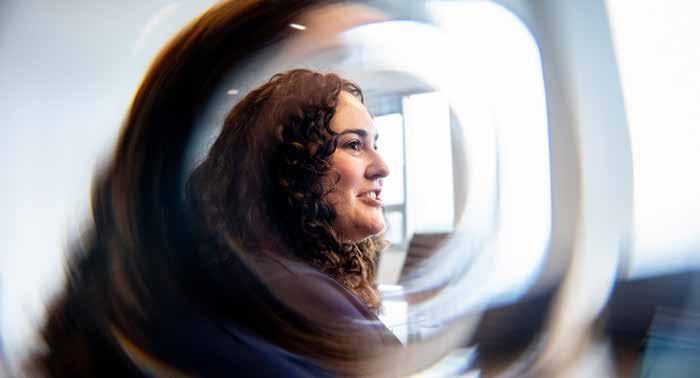




The value of reflecting on past accomplishments isn’t to feel a sense of contentment but rather to understand how our collective work positions us for continued success. This issue of The Darden Report celebrates many new heights the commitment, creativity and care of our community helped the School achieve this year. To name a few:
Ranked No. 1 public business school by U.S. News & World Report for the first time
Enrolled a class of students with the highest academic profile in school history
Launched the LaCross Institute for Ethical Artificial Intelligence in Business
Broke ground on new student housing on our Charlottesville Grounds and expanded UVA Darden DC Metro
Passed $625 million in total impact through the Powered by Purpose campaign
As you read about those accomplishments, I hope you — like me — see them not as high-water marks but rather indications of our strong momentum.
Our cover story (Page 14) also nods to the past while focusing on how to position the School for the future. We ask students — and the professors who hear from them every day — what they really want to learn while they’re at Darden. No surprise, navigating a business world defined by artificial intelligence leads the list. Even as AI grows as a disruptive force, readers might be pleased to discover that while some things for students change, many remain the same. At the end of the day, students have always come to Darden to share and discover different perspectives and become agile, future-ready leaders.
Agility is the name of the game for today’s business leaders at a time when uncertainty is coming from all angles. However, retiring Professor Andy Wicks reminds us that being able to answer

“Agility is the name of the game for today’s business leaders at a time when uncertainty is coming from all angles.
the “ultimate questions” to understand our core purpose remains as fundamental to our success as any other skill or technology (Page 10). And in our feature on topics impacting the HR function this year (Page 22), we’re reminded that almost every problem in business still boils down to people. Workforce development and talent management have never been more important. In a world marked by volatility and change — where agility aligned with values is key to success — the Darden community’s commitment to excellence and to one another stands out. Together, we navigate complexity with clarity, courage and compassion. Thank you for everything you do to make Darden an exceptional place.

SCOTT C. BEARDSLEY Dean and Charles C. Abbott Professor of Business Administration


What students expect from Darden has changed over the years. Explore the skills and issues today’s students across MBA formats are most interested in learning about.

The most common factor among the most pressing business issues in the year ahead? People. Find out the biggest workforce challenges HR execs are tackling today.

















Health care fraud costs the U.S. an estimated $100 billion per year, making it one of the most expensive financial leaks in the nation. AI can help solve it.
The Darden Report is published twice a year with private donations to the University of Virginia Darden School Foundation.
© 2025 Darden School Foundation Summer 2025, Volume 52, No. 2
University of Virginia Darden School of Business Office of Communication & Marketing
P. O. Box 7225
Charlottesville, Virginia 22906-7225 USA communication@darden.virginia.edu
Scott C. Beardsley
Dean and Charles C. Abbott Professor of Business Administration
Robert Weiler President, Darden School Foundation
Juliet K. Daum (TEP ’22) Chief Marketing and Communications Officer
EDITORS
Jay Hodgkins
McGregor McCance
ART DIRECTION & DESIGN
Hyphen
WRITERS
Lauren Foster
Dave Hendrick
Caroline Mackey
Molly Mitchell
CLASS NOTES EDITOR
Egidijus Paurys
PHOTOGRAPHY
Tom Daly
Ali Johnson
Jack Looney
Caroline Mackey
Andrew Shurtleff
Sanjay Suchak
ILLUSTRATION
Janis Andzans
Ivan Haidutski
Selman Hosgör
Hyphen
Calvin Sprague

With hundreds of alumni and guests in attendance in the Abbott Center Auditorium, the annual State of the School Address held during Darden Reunion Weekend offered a celebratory reflection on the School’s significant milestones and increasing momentum, such as record rankings and student applications.
Now in his 10th year at Darden, Dean Scott Beardsley told attendees, “Reflecting on the past decade, I am filled with pride for all that Darden faculty, staff, students and alumni have achieved.”
He also said the School’s mission — to improve the world by inspiring responsible leaders through unparalleled transformational learning experiences — had become more important than ever in a tumultuous world.
“Innovation, purpose and profit are not competing forces, but powerful allies,” he said. “We are absolutely unwavering in our commitment to education, changing people’s lives and developing responsible leaders who make the world a better place.”
Beardsley laid out cornerstones for sustained excellence approaching 2030 and Darden’s 75th anniversary: the people, the experience, the ideas, the infrastructure and the resources to power it all.
Ongoing faculty excellence and generational renewal are at the heart of the Darden experience. More than 70 new faculty have joined Darden in the past 10 years.
Innovative ideas and dynamic programming are Darden hallmarks. There are now three formats of the Darden MBA: Full-Time MBA, Executive MBA and Part-Time MBA. The Master of Science in business analytics is offered with UVA’s McIntire School of Commerce, and the School recently reintroduced the Ph.D. program. Non-degree programs continue to flourish with Darden offering executive education and lifelong learning programs for more than 50 years.
Supporting this dynamic population of learners means staying at the forefront of today’s top issues in business. To that end, the LaCross Institute for Ethical Artificial Intelligence in Business launched last September. The School also recently announced a new MBA concentration in AI, data analytics and decision sciences.
With the cost of higher education rising, scholarships remain a top priority. “We want to be accessible to meritorious talent,” said Beardsley.
The School’s infrastructure plans continue to advance. New student housing in Charlottesville is underway, Faculty Office Building renovations are imminent, and the UVA Darden Sands Family Grounds in Rosslyn, Virginia, recently expanded to enhance the experience for the more than 500 students studying there.

Scott Beardsley reflected on Darden’s accomplishments during his 10 years as dean during the annual State of the School Address this spring.

“WE ARE ABSOLUTELY UNWAVERING IN OUR COMMITMENT TO EDUCATION, CHANGING PEOPLE’S LIVES AND DEVELOPING RESPONSIBLE LEADERS WHO MAKE THE WORLD A BETTER PLACE.”
— DEAN SCOTT BEARDSLEY
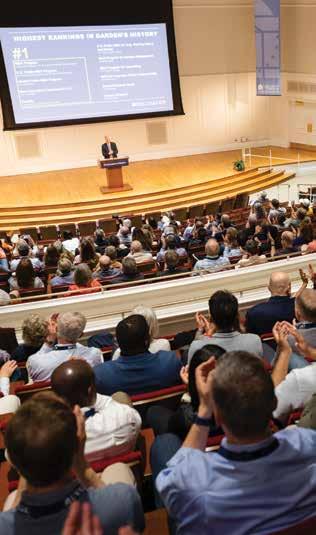
LAUNCHED PUBLICLY IN 2019 as part of the University of Virginia’s $5 billion Honor the Future campaign, Darden’s Powered by Purpose campaign came to an official close on 30 June. With an original goal to raise $400 million, the campaign this year passed $500 million in support for Darden. Including matching gifts and gifts held outside the Darden School Foundation, the total impact has soared past $625 million since the start of the campaign.
While final campaign results will be shared later this summer with celebrations of the incredible impacts in the fall, the campaign far exceeded Darden’s greatest ambition. Roughly three-quarters of alumni gave to the campaign. Their gifts support the four priorities of Powered by Purpose:
→⃝ Faculty, Thought Leadership & Curricular Innovation
→⃝ Scholarships, Financial Aid & Student Experience →⃝ Darden Grounds Master Plan, Technology & Innovation →⃝ Darden Annual Fund
Hundreds of alumni and guests gathered in Abbott Auditorium during Darden Reunion Weekend for an update on the School.
Following a ceremonial groundbreaking last fall, construction of new student housing on Darden Grounds in Charlottesville began in full this spring. When completed, the student housing project will add 218 units and 348 beds across four houses located adjacent to Wilkinson Courtyard and just behind the Abbott Center. Units will primarily be one- and two-bedroom apartments, along with studios and three-bedroom apartments.
Darden alumni and friends wrapped up the campaign with a bang this fiscal year. On Day for Darden, held in April, 1,570 donors came together to raise $1.37 million — the most ever raised for the Darden Annual Fund in a single day. Darden Reunion Weekend delivered strong attendance and $6.9 million in giving from reunion-year alumni. The School welcomed four new Principal Donors, who have made a transformational impact on the School’s ability to achieve its full potential through lifetime giving of $1 million or more.


POWERED BY ITS LEADING RESULTS in career outcomes and salaries for graduates, Darden now shares a position as the No. 1 public business school in the United States, according to new rankings from U.S. News & World Report. It’s the first time Darden has climbed to the top position among public schools in the U.S. News rankings, up from No. 2 a year ago and No. 3 the prior year. This ranking builds on No. 1 public MBA rankings from Bloomberg Businessweek and Poets & Quants. Overall, Darden is ranked No. 11 among all U.S. schools by U.S. News. Category ranking highlights include:
TIED FOR NO. 1 among publics, with the University of California-Berkeley
NO. 1 for “employed at graduation” rate for students, among all schools
NO. 1 for “employed three months after graduation” among Top 15 schools
NO. 1 public school for “average starting salary and bonus”
NO. 11 overall, including public and private institutions
Darden returned a two-year average of 86.8 percent of full-time MBA graduates employed at graduation. That topped all U.S. schools, public and private.
Darden also topped all public schools with its average starting salary and bonus total of $198,059. Darden earned the highest ranking among its competitive peer schools for the two-year average of full-time graduates who were employed three months after graduation (92.4 percent).
U.S. News also creates specialty rankings from its survey of business school deans. Darden earned a No. 5 specialty ranking for MBA for Management.
Darden Expands MBA Program Emphasis on AI, Data Analytics, Decision Sciences
Darden this spring announced a new MBA program concentration that will arm graduates with an enhanced set of highly sought skills in artificial intelligence, data analytics and decision sciences.
“Darden’s offering will prepare students to contribute to and lead organizations that use data, data science and artificial intelligence as part of their core business processes,” said Vice Dean and Senior Associate Dean for the Full-Time MBA Program Yael Grushka-Cockayne. “Students who complete the concentration will bring proven analytical and quantitative abilities to employers.”
The new AI, data analytics and decision sciences concentration gives Darden students another potential track to gain specialized skills and experiences that position them to secure careers in the fields that interest them the most. The concentration will offer students 25 courses from which to choose, with the concentration requiring completion of at least six of the courses.
Darden has been an early adopter of coursework, case studies and practical research in the areas of AI, data analytics and decision sciences. The School also offers analytics courses and a joint degree program in analytics with the UVA McIntire School of Commerce.

Darden in February announced a partnership with OpenAI, solidifying its position as a leader in AI-focused business education. The initiative brings ChatGPT EDU to Darden, providing faculty, staff and students with a secure, compliant and tailored AI platform designed for academic excellence and organizational innovation.
Darden is among just a few business schools worldwide that have partnerships with OpenAI to incorporate ChatGPT EDU. The early implementation provides Darden a competitive advantage and also positions the School to benefit from a secure generative AI platform that will unlock new capabilities in the classroom, research centers and enterprise operations.
The OpenAI partnership initially provides faculty and staff with access to ChatGPT EDU tools, with student access to be phased in. Darden students will have immediate interaction
“We are putting ourselves in position to help create a blueprint of how AI is used in higher education.”
— Kush Arora Darden Chief Digital Officer
with ChatGPT EDU in classes in which the technology is being used by faculty for case studies or other purposes. AI tools are being rapidly deployed and integrated in new courses across Darden.
For example, in the “AI in Marketing” elective led by Professor Raj Venkatesan, Part-Time MBA students had ChatGPT EDU access to interact with and evaluate a customer service chatbot using a custom GPT, pitch their marketing plans to a custom GPT designed to take on the role of chief marketing office for Ford Motor Company, and generate sentiment analysis for a product or service. For his “Digital Operations” course, Professor Tim Laseter built a “Tech Note GPT,” which he created with 10 of his tech notes and six articles. Students can query the GPT to ask for advice in preparing for case discussions.
DARDEN ANNOUNCED its Part-Time MBA program in 2021, with school leaders predicting pent-up demand for a flexible format of the Darden MBA in the Washington, D.C., area.
The first cohort of Part-Time MBA students walked UVA’s Lawn as members of the Class of 2025 in May, and the predictions have proved accurate. Class enrollment goals have been met or exceeded each year and three successive cohorts are making their way through the degree path.
“Like any new program, there has been a lot to learn,” said Professor Yael Grushka-Cockayne, who served as senior associate dean for professional degree programs until 30 June. “But when I think about what we set out to do, to provide more opportunities for people in the region to experience Darden and to get an MBA, I think we’re accomplishing that tremendously.”
The flexibility of the program, with variable pace and evening,
53 PERCENT OF STUDENTS HAVE MADE CAREER CHANGES AND ABOUT A THIRD OF STUDENTS HAVE FOCUSED ON ACCELERATING GROWTH WITHIN CURRENT ROLES.
in-person classes, fits well into the lives of many Part-Time MBA students, who are, on average, 28 years old. Grushka-Cockayne said the program attracts students advancing in their current career trajectories and “leveraging the idea that they can take a slower-paced, local MBA to work around their schedule — and to really progress and invest in themselves.”
Class data shows that 53 percent of students have made career changes, and about a third of students have focused on accelerating growth within current roles, demonstrating “the Part-Time MBA’s power to facilitate career pivots and drive advancement,” said Gopika Spaenle, managing director of professional degree programs for the Darden Career Center.
Despite busy personal and professional lives, Part-Time MBA students formed a unique community almost immediately, creating clubs and initiatives and seeking pathways for engagement with both the Executive MBA students in Rosslyn and Full-Time MBA students in Charlottesville.
Nate Hukill (PTMBA ’25) is among the recent graduates who took a leadership role in building the new community. A contract manager at Accenture Federal Services, Hukill said he knew he was joining a new program that wouldn’t be “immediately perfect,” but trusted that a format launched under the Darden name would become a high-quality product.
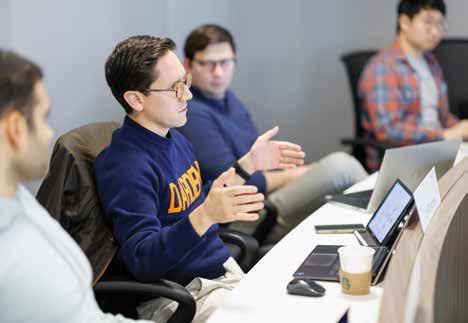
“We’re leaving the program in a better place because of student feedback and work that we’ve been able to do with the program team, which has been extremely receptive and supportive,” said Hukill, who served as president of the Darden Part-Time Student Association (PSA). The creation of the PSA helped Part-Time MBA students take part in UVA’s unique tradition and culture of student self-governance.
Hukill said the 63 students who started the program together quickly bonded over the course of the first few months of the program, and he is fully confident Darden is on a trajectory to be a Top 5 Part-Time MBA program in the world.
“The recipe is there,” Hukill said. “The combination of world-class professors, a student-oriented administration, a fantastic campus in Rosslyn, and a highly motivated and globally diverse student population creates an experience that only Darden can provide.”
Including the first graduates of the Part-Time MBA program, the MBA Class of 2025 took part in UVA Final Exercises on the Lawn and Darden’s academic regalia ceremony on Flagler Court in May. Meet the newest members of the dynamic Darden alumni network.

Full-Time MBA graduation speaker Betsy Brandon (MBA ’25) was the recipient of the Samuel Forrest Hyde Memorial Fellowship, which is considered Darden’s highest student honor and recognizes a Second Year student who has excelled in areas including academics, community building and marketing.
Full-Time MBA graduates Executive MBA graduates Part-Time MBA graduates
17 students received the C. Stewart Sheppard Award recognizing exceptional service to the School of a nonacademic nature: Jack Alexander, Carly Andrews, Jason Carrier, Erin Drury, Rebecca Dsilva, Precious Ezealigo, Rebecca Gullickson, Spencer Holmgren, Jillian Howland, Nathan Hukill, Elsa Joy, Dylan Kenney, Stephanie Massucco, Madelyn Merchant, Lieneke Schol, Homero Mendoza and Evan Waghelstein.
Seiver Jorgensen received the Frederick S. Morton Award, presented to Full-Time MBA students for excellence in leadership.
Amanda Thomas received the Executive MBA Faculty Award, presented to an outstanding student in the Executive MBA program, and Elias Samaha received the Part-Time MBA Faculty Award, presented to an outstanding student in the Part-Time MBA program.
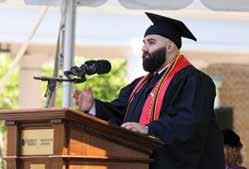
Aman Dar (PTMBA ’25) became the first graduation speaker in the history of Darden’s Part-Time MBA, which was first announced in 2021.
CLASS OF 2025 ELECTED GRADUATION
Betsy Brandon, Full-Time MBA
“The grit and the warmth of the people here at Darden highlighted something very powerful to me: How you show up to the environments you are in matters.”
Jimmy Anthony, Executive MBA
“Wherever your path leads you, always be the one who pulls up a chair for someone else.”
Aman Dar, Part-Time MBA
“We carry forward not only what we learned, but who we learned it with.”
FACULTY MARSHALS ELECTED BY THE CLASS OF 2025
Peter Belmi / Full-Time MBA Faculty Marshal
Pnina Feldman / Full-Time MBA Faculty Marshal
Elena Loutskina / Full-Time MBA Faculty Marshal
Bo Sun / Full-Time MBA Faculty Marshal
Shane Dikolli / Full-Time and Executive MBA Faculty Marshal
Yael Grushka-Cockayne / Executive and Part-Time MBA Faculty Marshal
For retiring Darden Professor Andy Wicks, thinking about big questions is part of his identity. In Ultimate Questions, his new book set for publication this summer, Wicks explores issues core to the human experience, with the hope that it will help others lead more fulfilling lives.
Based in part on the course he has taught as a business ethics professor at Darden, Ultimate Questions tackles four fundamental questions:
1. Who are we?
2. Why are we here?
3. What does it mean to live a good life?
4. How should we get along with others?
The order of the questions is deliberate, starting with self-understanding, then defining one’s purpose, and finally addressing social interactions. Wicks notes that our answers shape our perceptions of others and can influence our behavior, either fostering compassion or leading to cruelty. They also build on each other and extend from the individual to a larger communal context.
For Wicks, these aren’t just academic musings. They are part of everyday life — yet most people don’t recognize the questions or explore answers until someone asks them.
It is also especially personal to him given where he is in his life journey.
“I am staring squarely at my own mortality,” he writes in the preface.

Andy Wicks Ruffin Professor of Business Administration and Richard M. Waitzer Bicentennial Professor of Ethics,
retired this year as he battles a progressive neurodegenerative disease.

Wicks’ new book will be published by UVA Press in August.
A progressing neurodegenerative disease has forced Wicks to confront life’s biggest questions on profoundly personal terms.
“It is very fitting that this will be my last book and my last major publication,” he shared recently in an interview facilitated by his wife, Cathy. “It is clear to me now that this was the thing that I was put on earth to do; not necessarily just to write this specific book, but to be invested in — and articulate — this path, this way of engaging with life, this way of living these questions.”
One of Wicks’ earliest heroes, when he started reading about philosophy, theology and applied ethics, was Socrates, the classical Greek philosopher. In Plato’s “Apology,” Socrates claims, “the unexamined life is not worth living.” Indeed, that phrase has served as a North Star for Wicks over the course of his career and life.
“Socrates is asking us to become aware of how we approach life and be willing to consider alternatives, especially when our current approach isn’t serving us,” he writes.
In the Darden classroom, Wicks fully explored the ultimate questions through his popular elective, “Ultimate Questions and Creating Value for Stakeholders.”
“These are such hard questions that at the beginning of the class, my students would often say, ‘Wow, if I sit down and try to answer them, I really don’t feel good about my answers — I have a lot of work to do to come up with better answers’,” Wicks recalls. “And that’s part of the class — not to create shame, but to help students acknowledge how we often ignore things that really matter to us.”
Long before Darden, Wicks was a graduate student headed down a path toward medical ethics or applied religious or philosophical ethics. But along the way, he met Professor Ed Freeman, widely considered the father of stakeholder theory, who opened his eyes to what business ethics was all about.
The pair hit it off: Wicks became Freeman’s research assistant, and Freeman joined Wicks’ dissertation committee.
After graduating, Wicks went on to teach at the University of Washington for a decade, before Freeman helped recruit him to Darden in 2002. Over the years, Wicks’ leadership roles across the School expanded to include director of the Olsson Center for Applied Ethics, academic director of the Institute for Business in Society, academic adviser for the Business Roundtable Institute for Corporate Ethics and director of Darden’s doctoral program.
“IT IS CLEAR TO ME NOW THAT THIS WAS THE THING THAT I WAS PUT ON EARTH TO DO; NOT NECESSARILY JUST TO WRITE THIS SPECIFIC BOOK, BUT TO BE INVESTED IN — AND ARTICULATE — THIS PATH, THIS WAY OF ENGAGING WITH LIFE, THIS WAY OF LIVING THESE QUESTIONS.”
Wicks stresses that his book is not about providing answers, but about learning to ask better questions and choosing to “live them” intentionally. The power of asking questions, he says, lies in reminding ourselves to be humble and doubt things we know. That’s not to say, “don’t believe,” but rather, to believe while retaining your humility and be open to new ideas, beliefs and experiences.
Asked what he hopes readers will take away from the book, Wicks offers a simple phrase: “Pay attention to your life.”
“It’s an invocation for the reader,” he explains. “It’s not ‘here’s the answer.’ It is really an invitation to wake up, to pay attention and to be willing to ask those hard questions about your life, not because there’s some external critic you’ve got to satisfy, but because it helps you have the kind of life that you would like to have.”


Yiorgos Allayannis Distinguished Associate Professor of Business Administration Robert Carraway thought he was only interviewing as a favor to a friend when he arrived on Darden’s Grounds in 1984, but that day changed the course of his life. “By the evening of my first day visiting, I knew it was where I wanted to be,” he said. He came to Darden after receiving his B.S. and MBA from East Carolina University and his Ph.D. from Purdue University, and soon after co-authored the successful case and textbook Quantitative Analysis for Business
Carraway taught MBA classes in the area of data analytics and decision sciences, and he also taught executive education classes to lifelong learners around the world. He served as senior associate dean for the Full-Time MBA program from 2006–11 under Dean Bob Bruner. “Countless students have benefitted from his wisdom, and he’s been an incredible mentor of so many,” said Dean Scott Beardsley.
Carraway has won several teaching honors, and he says a personal highlight is when former students share the pivotal role Darden played in their career successes. Looking forward, Carraway is optimistic about the School’s faculty, filled with individuals who “are not only excellent researchers but who share my enthusiasm for delivering high-impact educational experiences to our students.”


Senior Lecturer Marc Modica joined the Darden community in 1998, bringing broad international experience to his negotiation, communication and conflict management teaching. Before coming to Darden, Modica taught for 10 years at the International University of Japan. He had occasion to meet visiting Darden professors there, and when he moved back to the United States, he became convinced Darden was where he wanted to be.
At Darden, Modica has been “a cornerstone of our Communication faculty,” said Dean Beardsley, who highlighted Modica’s significant contributions to the School’s global programs. Modica’s interest in international business, economics and politics dovetailed with the courses he led through Darden’s Center for Global Initiatives and Global Executive MBA, which he considers some of the most fulfilling experiences of his career. Locations of global courses he led included the United Arab Emirates, Mexico, Vietnam, Denmark, Sweden, Brazil, China, India, Singapore, Sri Lanka, South Korea, Latvia and Japan.
Modica noted being a co-director of the LEAD program, which served rising seniors in high school, as another highlight of his time at Darden. “They were just brilliant kids,” he said. With a rich mix of experiences during his time at Darden, he proclaimed: “The Darden community is all it’s cracked up to be.”


Robert “Bob” Harris, the C. Stewart Sheppard Professor of Business Administration, joined Darden in 1988 and has served as a teacher, researcher and leader ever since, including serving as dean from 2001 to 2005. In addition to teaching corporate finance, private equity, financial markets, and mergers and acquisitions, he made decisions as dean that “fundamentally changed the School,” said Dean Beardsley. Harris helped launch the Partnership for Leaders in Education, a joint program of Darden and the UVA School of Education and Human Development that elevates the quality of education for students across the United States, and Darden’s Executive MBA format. Significantly, he oversaw the establishment of the School’s financial self-sufficiency model.
Harris has been widely published in leading journals, authored financial textbooks and business cases, and been a consultant to corporations and government agencies. But his work in the classroom stands out as his proudest accomplishment. “It is a delight when you see someone learn something, especially for the first time. Being able to contribute to the School in various ways — teaching, working with executives, doing administrative work, conducting research — is special,” he said. “Those activities gave me the chance to meet and work with so many talented and often fun people. I cherish those memories.”

BY DAVE HENDRICK
As an elementary school student, Professor Laura Morgan Roberts envisioned two potential career paths. She might be a translator, she thought, listening to different global perspectives, and interpreting and sharing across cultures and languages. Alternately, maybe she would be a DJ, figuring out how to move a crowd, infuse energy and share messages that enliven the human experience.
Spoiler: Roberts did not become a professional translator or a DJ. Still, she likes to think she regularly flexes some of those early childhood interests in her role as a professor and organizational psychologist with a globally renowned body of work.
“When I think about what we do in the classroom, the DJ and the translator are still there,” Roberts said.
While the elementary school ambitions shifted, Roberts did settle on a future profession early. As a high school student interning in a program for young people interested in business, she resolved to one day work on what she calls “the human side of the enterprise.”
“I didn’t have that language at the time, of course,” Roberts said, “But I knew I was interested in people’s career motivations, in different kinds of workplace conflicts and social dynamics, and what brings people together around common purpose. Decades later, that’s still what I’m doing.”
Raised in Gary, Indiana, Roberts grew up in a family with a long history of academic excellence and achievement, and she and her two sisters continued the family tradition. Both of her sisters were valedictorians of their high school before attending Duke University and Brown University, and Roberts was in the inaugural class of the Indiana Academy for Science, Mathematics and Humanities, a public residential magnet school based at Ball State University.
Roberts opted for the University of Virginia over Stanford for college, interested in a school with a strong business program and student governance, while also drawn to her family heritage on the East Coast. Later, Roberts learned her great grandmother was born in Charlottesville, and the family traced its lineage through
generations of both free and enslaved laborers at the university. But at the time, UVA simply seemed like the most welcoming environment for an ambitious 18-year-old with an interest in business and psychology.
An Echols Scholar with the ability to chart her educational journey, Roberts took classes in the McIntire School of Commerce but also followed her interests across courses in sociology, African-American studies and psychology. She earned a degree with the highest distinction in the latter. Roberts went from UVA directly to graduate school at the University of Michigan, where she earned a master’s degree and Ph.D. in organizational psychology.
At 27, Roberts began her first full-time professor position, teaching the core leadership and organizational behavior course to Harvard Business School MBA students.
Imagine the moment, as the recently minted Ph.D., essentially the same age as her new students, steps into the pit of the 90-person classroom to lead the required leadership course at one of the world’s most prestigious graduate business programs, with, as Roberts recalled,“nothing but a piece of chalk.”
“Basically, it’s me and the chalk and 90 people, for whom 50 percent of their grade is class participation. And I’m the sole evaluator,” said Roberts. “The case method is a curious approach; it requires tremendous trust in a two-way dynamic. The students trust that the professor asks the right question at the right time to help them have the conversation they need to have. As a business school professor, you have to earn that trust, and that credibility, one conversation at a time — especially when you bring a unique background.”
It was a period of great challenge and personal and professional growth, as Roberts was learning how to teach in a high-pressure environment, ramping up research and publishing on a range of topics related to cultivating individual strengths and maximizing human potential in work organizations.
One enduring piece from this era, “The Reflected Best Self Exercise,” has been used by tens of thousands of individuals and many large organizations. The unique personal and
“THE CASE METHOD IS A CURIOUS APPROACH; IT REQUIRES TREMENDOUS TRUST IN A TWOWAY DYNAMIC. THE STUDENTS TRUST THAT THE PROFESSOR ASKS THE RIGHT QUESTION AT THE RIGHT TIME TO HELP THEM HAVE THE CONVERSATION THEY NEED TO HAVE.”
professional assessment tool Roberts co-created aims to help leaders uncover their personal best and accentuate strengths. An article accompanying the exercise was included in Harvard Business Review’s “10 Must Reads For Business Students,” a volume published in 2023 — nearly two decades after the publication of the article.
The Best Self tool is one of many examples of Roberts’ works that have become touchstones in the field, leading to plaudits from organizations such as Thinkers50, which spotlights leading management and business thinkers.
“Creating fairer career opportunities is an urgent necessity,” the organization wrote in citing Roberts in 2021. “Laura Morgan Roberts is leading the way in making this reality.”
“I’ve always just followed my gut,” Roberts said of her approach to research and publishing. “I’ve always pursued work that I’m interested in, that I believe in, and that I think can help make a positive difference and a better world.”
After moving on from Harvard, Roberts spent time at Antioch University and was living in Washington, D.C., teaching at Georgetown McDonough and raising her two children. She received word that Darden was opening new Grounds in Arlington, Virginia. An upstart venture with her alma mater was appealing, and Roberts joined Darden in 2019 as a member of the Leadership & Organizational Behavior team, quickly becoming a key contributor in professional degree and Executive Education & Lifelong Learning programming.
Roberts earned tenure at Darden and was recently named a Frank M. Sands Sr. Associate Professor of Business Administration. Her recent courses include “Leading Organizations,” “Leading Change,” “Organizational and Individual Change” and “Servant Leadership,” among others.
In the classroom, the mutual trust-building is never finished in an ever-changing business leadership context, Roberts said, but the transformational learning moments make it worthwhile and gratifying.
“We are able to enter into spaces where people can process information out loud, can express divergent viewpoints informed by data and recommend various courses of action in a civil way,” Roberts said. “I work really hard to create an environment in my classrooms where people can have tough conversations and walk out of that space with their shared humanity and dignity intact.”
As someone who has been devoted to the education of self and others from a young age, and has now published dozens of journal articles and book chapters and edited three books, the ability to work in an environment of continuous education is an ongoing incentive.
“I feel very fortunate that I am able learn something new every day,” said Roberts. “I’m always, always learning.”




From tough conversations to tech trends, today’s Darden students push the boundaries of business education with evolving interests in more relational expertise and cutting-edge topics.
BY MOLLY MITCHELL ILLUSTRATIONS BY SELMAN HOŞGÖR

t’s been 70 years since the
of Business MBA program launched in 1955, its classrooms filled with students who came of age during World War II partaking in a single residential format and preparing to thrive in a postwar economy.
Executive MBA student Lauren Pate:
“Strategic thinking is what I came to learn. At times in the workplace, I found myself doing the day-to-day tasks and not taking a step back and thinking about the bigger context. Learning a more strategic approach will help make me a better leader.”
Fast forward six generations, and today’s Darden MBA students have more options to earn a degree, choosing from among three formats. With 27 being the average age of Full-Time MBA students when they start the program, 28 for Part-Time MBAs and 35 for Executive MBAs, most are Millennials or in the first years of Gen Z. For them, the internet was a given, and their cohorts are shaped by rapid technological change, upheavals in communication and economic uncertainty.
Today’s MBA students across formats still choose Darden for its top-ranked faculty and educational experience. According to the School’s annual end-of-year survey for Full-Time MBA students, nearly 70% of the Class of 2025 identified the case method, faculty quality or the program’s academic rigor as what they liked best about the academic program. They still prioritize fundamental business skills, but they also seek more: the confidence to aim for meaningful work, a sharper focus on the interpersonal nature of business and the tools to deploy technologies that didn’t even exist a few years ago.
One notable shift in interest for students isn’t technological, but interpersonal.
“There’s definitely an interest in learning around having tougher conversations,” said

Professor Yael Grushka-Cockayne, vice dean and senior associate dean for the Full-Time MBA program. Grushka-Cockayne recently swapped program leadership positions with Professor Melissa Thomas-Hunt, who is now senior associate dean of professional degree programs after leading the Full-Time MBA program previously. “They want to learn how to engage in dialogues that are more meaningful and deep, and learn how to approach those dialogues with open ears and willingness to learn a different perspective.”
Lively discussion in class has always been a hallmark of Darden and the case method, but some students want to push further into building trust, empathy and understanding in an increasingly polarized world.
One unique way to achieve this has been through the Darden Fight Club, a debate club shepherded by Professor Bobby Parmar. Full-Time MBA students approached Parmar with the idea three years ago, interested in deeper conversation and feedback than the case method could provide with a 60- to 70-student section. Around 12 students run the club every year, selecting students with different backgrounds and unique points of view to participate. Contrary to the tongue-in-cheek name of the club, the willingness to argue constructively and show care and compassion for classmates are considered tablestakes to join.
The students decide the topics and style of debate, while Parmar advises and offers feedback to help students understand
Professor Bobby Parmar:
“They really see this ability to disagree constructively as an important leadership skill.”
patterns and bigger-picture discussion skills.
“I think they learn a lot about how to argue effectively, how to listen carefully,” said Parmar. “They come to see the difference between debate and dialogue. What does it take to win a debate versus what does it take to really understand someone else?”
The formation of this club reflects a growing portion of students who are dissatisfied with the tenor of conversation in society and want to do something different. “They really see this ability to disagree constructively as an important leadership skill,” said Parmar.
For Lauren Pate, a member of the Executive MBA Class of 2026, the Darden experience is about the bigger picture.
“I wanted to broaden my horizons,”

she said. Without many quant or business nitty-gritty type classes in her educational background at Notre Dame, Pate wanted to become more well-rounded in those practical skills as a step toward a more thoughtful approach to her career.
“Strategic thinking is what I came to learn,” she said. “I think a lot of decisions I’ve had to make have come from a place of not having options. At times in the workplace, I found myself doing the day-to-day tasks and not taking a step back and thinking about the bigger context. I think learning a more strategic approach will help make me a better leader.”
Tarah Scamardella (PTMBA ’25), a member of the first graduating cohort of Part-Time MBAs, confirmed strategic thinking was a key draw for her and her classmates. As her finance role increasingly included strategy decisions and collaboration with teams across the company, she felt like she would benefit from additional education to “connect the dots.”
“I was thinking, if I want to be a controller or CFO or COO one day, what’s going to help drive me to that level?” Scamardella said.
Pate noted a characteristic “scrappy” attitude among her class, which manifests in excitement about topics like entrepreneurship, defense tech and venture capital.
Grushka-Cockayne confirmed rising interest among students in all formats in venture capital and private equity. They have a lot of questions about those worlds, and she noted growing interest in acquiring companies and restructuring them. The momentum around entrepreneurship and venture capital may signal a shift away from climbing the traditional corporate ladder in favor of a more varied career.
Darden has augmented its offerings in the VC space in recent years. The Venture Capital Initiative was launched in 2021 and houses opportunities like internships at VC firms, and in 2024 the School launched its Private Equity Initiative with a variety of hands-on learning opportunities.

Some foundational skills and student interests are evergreen, like how businesses communicate. While the tools of communication and marketing have been changing at light speed, the core principles endure.

Professor Lili Powell
Julie Logan Sands
Associate Professor of Business Administration
Professor Lili Powell:
“One of our newer electives, ‘Storytelling with Data,’ has taken off like a rocket with almost 60 percent of our residential MBAs wanting to take it as a First Year elective.”
82 percent of prospective master’s degree students are seeking programs that are in person either full time or part time.*
The share seeking part-time in-person programs was only 4 percent from 2020–2023, but that more than doubled to 9 percent in 2024.
“When it comes to program modality, we found a resurging preference for in-person delivery, perhaps related to more ‘return to office’ mandates or younger candidates’ desires to interact in-person.”
*GMAC Prospect Students Survey — 2025 Report
DARDEN’S CURRENT STUDENTS are clear about what they want, and their professors are experts at integrating that feedback into the MBA program. However, the faculty and School leaders are careful not to become insular.
Darden continues to position itself for what the broader pool of elite prospective students seeks from a business school education.
The Association to Advance Collegiate Schools of Business (AACSB) published its three trends to watch in 2025 this spring. Trend No. 1: Demand for career-aligned programs, because the latest generation of students is expressing greater concern over higher education’s ROI.
“Gen Z’s approach to learning differs significantly from that of previous generations. This cohort prioritizes multimodal learning, costefficiency, rapid content delivery and practical application.”
Two more trends that define business education today: flexibility and personalization. Those trends are “being driven by evolving student expectations alongside rapid technological advancements, particularly the integration of artificial intelligence,” the AACSB wrote in its 2025 State of Business Education report. “Gen Z’s approach to learning differs significantly from that of previous generations. This cohort prioritizes multimodal learning, cost-efficiency, rapid content delivery and practical application.”
The Graduate Admission Management Council’s (GMAC) 2025 survey of nearly 5,000 prospective graduate management education students was rich with broader insights about what resonates with Darden’s target market. Among them:
Candidates are more interested in hands-on AI classroom experiences.
Candidate interest in hybrid and flexible programs declined as preference for both full-time and part-time in-person programs increased. Consulting, financial services and technology still top the list of preferred industries to work in following graduation.
As Darden students also frequently cite, “strategic thinking” topped the GMAC survey list among skills prospective students want to develop in business school. Three-quarters of surveyed prospective students named “strategic thinking,” while “problem-solving,” “decision-making” and leadership skills” were each named by two-thirds of survey respondents. Darden’s own internal surveys indicate the School is highly regarded by both students and employers for developing those skills in its graduates.
The business education-focused media outlet Poets & Quants offered its own take on MBA trends. Not surprisingly, AI’s impact revolutionizing MBA education topped the list, and the publication also reinforced what Darden students say about wanting experiential learning opportunities and more flexibility, such as through formats like Darden’s Executive and Part-Time MBA. Outside of the classroom, Poets & Quants noted that students increasingly expect their schools to support their mental health and well-being.

“In communication, we have so many topics of interest that range from premodern to post-post-modern times,” said Professor Lili Powell, academic head of the Communication area. “Students want and need to learn enduring topics that date back to Aristotle’s The Art of Rhetoric, including communication strategy and the use of ethos, pathos and logos.”
At the same time, understanding up-to-the-minute communication tools is a necessity. Powell noted that generative AI is becoming part of the toolkit, from analyzing presentations to drafting written and visual messages. “One of our newer electives, ‘Storytelling with Data,’ has taken off like a rocket with almost 60 percent of our residential MBAs wanting to take it as a First Year elective.”
Professor Luca Cian, Marketing academic area head, observed that many students arrive seeking specific technical skills but broaden their interests to a more holistic perspective in the course of their MBA. In marketing, he says, Darden students “have consistently shown keen interest in areas such as consumer behavior, brand management, digital marketing, pricing and marketing analytics.”
But lately, emerging topics are gaining more of a foothold.
“Subjects like influencer marketing and artificial intelligence in marketing have gained prominence,” he said. “Students frequently inquire about practical applications of these technologies.”
Cian said Darden’s case method approach, used in all formats, continues to effectively broaden perspectives. “Initially, many see marketing as primarily about promotion, but they leave Darden understanding its critical role in product development, pricing strategy and overall business model design.”
Full-Time MBA student Mike Gaynor: “I think the value of an MBA is: If you have a strong foundation, then it becomes a lot easier to build with whatever pieces are thrown your way. AI is just one piece.”

Professor Luca Cian Killgallon Ohio Art Professor of Business Administration
Professor Luca Cian:
“Initially, many see marketing as primarily about promotion, but they leave Darden understanding its critical role in product development, pricing strategy and overall business model design.”
If there’s one topic dominating conversations across fields, it’s artificial intelligence.
“AI is sort of the trendy thing,” said Full-Time MBA student Mike Gaynor (Class of 2026). He believes AI is a transformative force that future business leaders must understand.
“Basically, there’s no aspect of society that’s going to remain untouched. So, number one is learning how to use AI most effectively and understand what it’s good for and what it’s not.” He’s particularly interested in how to apply it in data analytics and decision-making, an interest many of his classmates share.
Staying on top of a rapidly changing business environment and demand for AI expertise, Darden established the LaCross Institute for Ethical Artificial Intelligence in Business in fall 2024, and in the spring of 2025 announced a new MBA program concentration in AI, data analytics and decision sciences, with 25 courses from which to choose.
“I think the value of an MBA is: If you have a strong foundation, then it becomes a lot easier to build with whatever pieces are thrown your way,” said Gaynor. “AI is just one piece. Even if it’s not necessarily always clear, at least you’ve got a fighting chance.”
BY DAVE HENDRICK ILLUSTRATION BY CALVIN SPRAGUE
From post-election regulatory shifts to the adoption of AI to the drive to upskill and reskill employees for the future of work, the need for the right people doing the right job in the ideal organizational structure is front of mind for organizations determined to thrive amid uncertainty.
“In my experience, HR has never been more important, and that’s not just a platitude,” said Professor Scott Snell, who teaches throughout Darden’s degree and non-degree programs and serves on the board of directors for the Society of Human Resource Management. “CEOs are engaging their CHROs saying, ‘We’ve got to work together through these issues.’ There’s opportunity here, but there’s also risk to the business if they don’t get it right.”
With its track record of leadership development, general management orientation and close connection to the world of practice, Darden experts offer a unique perspective on current workforce talent and human resources issues.
We recently asked a trio of Darden thinkers in Executive Education & Lifelong Learning, the MBA program and Alumni Career Services a simple question:

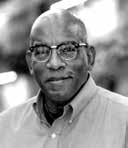

SNELL
Eleanor F. and Phillip G. Rust
Professor of Business Administration; Board Member, Society for Human Resource Management
MIKE THOMPSON ( MBA ’ 85 )
Former HR Executive; Independent Coach and Facilitator; Darden Alumni Career Services Career Coach
ANNE TRUMBORE
Chief Digital Learning Officer, Darden Sands Institute for Lifelong Learning
Read on for their thoughts on the big themes in talent management and HR.
Snell: AI and technology are especially good at certain analytical and operational tasks, improving efficiencies and enhancing productivity. But the creative, interpersonal and relational aspects of work are still pretty well the domain of people. Elements of work that are uniquely human will be the last to be taken over by AI. Ideally, technology is a complement to human capacity, not a substitute. There’s a concerted effort to upskill and transform the workplace along those lines.
Thompson: Organizations are experimenting with using AI in a variety of HR applications, including recruitment, selection, performance management, and training and development. Although AI shows great promise in these areas, organizations need to also understand — and manage — the risks.
Trumbore: As demographic shifts accelerate and technology continues to redefine the workplace, talent management is entering a new era. For companies to remain competitive, investing in strategic human-capital management is no longer optional — it’s imperative. This evolution will require many organizations to rethink their current HR capabilities. Some will need
to build new capacity in learning and development, including leveraging cutting-edge learning technologies and forging partnerships with traditional and emerging education providers. Others may turn to their existing HR teams, tasking them with responsibilities they may not yet be equipped to handle.
Trumbore: The U.S. is approaching “peak high school graduate” in 2025, after which the pool of new college-educated workers will begin to shrink. While the short-term labor market may appear favorable, forward-looking companies are already preparing by creating learning pathways that deliver value to both employees and the bottom line.
We’re on the brink of a fundamental disruption in how businesses attract, develop and retain talent. The educational systems that once supported workforce readiness are no longer sufficient. Smart companies will rise to the challenge by building robust, ROI-focused human capital strategies that integrate education and advancement as core components of their employee value proposition.
Thompson: Organizations are vying for a limited pool of talent. Although talent can now be considered national due to remote work arrangements, organizations still struggle attracting the best talent. More critically, organizations find it difficult to retain their top talent, particularly when that top talent is being passively recruited by other firms.
Snell: During the pandemic, when nearly everyone was remote, we got used to that arrangement. Many organizations found that, perhaps
“ WE ’ RE ON THE BRINK OF A FUNDAMENTAL DISRUP TION IN HOW BUSINESSES ATTRACT, DEVELOP AND RETAIN TALENT. ” – ANNE TRUMBORE
surprisingly, people were productive, even though they weren’t in an office. Now, a preponderance of people want to retain some element of hybrid work, and research suggests that many graduating students now say they would turn down a job offer that didn't have some hybrid component. The focus for some time was on whether it was possible to incorporate hybrid and still be productive. Fewer organizations paid enough attention to what it began to do to their culture. Do you dilute the employment brand when you’re not together? When so much onboarding has been taking place remotely, are there limits to how quickly you can develop people in their new roles? These questions are perplexing to many executives.
Thompson: The rapidly changing business landscape is requiring organizations to increase their investments in training to help equip their employees with the skills necessary to compete in the marketplace.
Trumbore: Not every company needs to establish a corporate university, but every business must design education pathways that foster internal advancement. Doing so isn’t just good for employees, it’s a smart way to drive retention and control recruiting costs.
Snell: There has been a rapid change in organizations backing away from DEI commitments. One question many executives struggle with is how to pursue the substantive benefits of a diverse and
inclusive workforce while still adhering to some of the recent executive orders around DEI. Taken together, these trends in talent management increase my interest in the evolving dynamics of workforce ecosystems.
Organizations today are increasingly interdependent with others, and the way they create value in the marketplace is by collaborating with other organizations. Very few of us work on our own anymore. We have collaborators, partners, joint ventures and alliances. The resulting network of talent creates scenarios where you end up employing people you don’t manage and managing people you don’t employ. HR has not been great at looking outside of its own boundaries in this way. Some exciting research is exploring how organizations are shifting the paradigm on this issue.
Thompson: There are now five generations in the workplace — from Gen Z (born after 2001) to “Traditionalists” (born before 1945). Each generation brings different styles, values, attitudes, expectations and experiences to the workplace. Managers need to understand the unique qualities that each of these generational employees bring to the workplace and how to leverage those qualities in ways that maximize performance.
Thompson: According to the Gallup organization, the percentage of engaged employees in the U.S. fell to 31% in 2024, the lowest level in a decade. These low levels of engagement impact many organizational metrics, including retention, productivity, quality, customer service and, ultimately, bottom-line revenue.
Thompson: Organizations are struggling to bear the brunt of rising health care costs, and they are gradually reducing their contributions to employee benefits packages, passing more of the burden onto employees.
Trumbore: The next generation of talent development leaders must understand AI, emerging learning platforms, adult learning theory and effective instructional design. While today’s HR teams have strengths, most lack the specialized expertise needed to lead the next era of talent development. To succeed, companies must proactively invest in new capabilities — bringing in talent with the skills to build and scale modern, strategic learning initiatives.
With its mission to support learners by providing transformational learning experiences in business education at all stages of their career, Darden’s Sands Institute for Lifelong Learning conducts research, delivers programs and convenes thought leaders to explore talent development in the age of AI. Learn more at www.darden.virginia.edu/sands-institute.















Fraud in the American health care system is far worse than broadly known. And it’s easier to fleece the system than you might expect.
Every year, this problem drains an estimated $100 billion through fraudulent claims, waste and abuse, making it one of the most expensive financial leaks in the nation. That’s more than $300 annually for every American.
“Health care is uniquely susceptible to fraud,” says Professor Christoph Herpfer, co-head of the Darden School’s Health Care Initiative, housed within the Institute for Business in Society.
From phantom billing to upcoding, fraud thrives in the shadows of outdated systems, information gaps and misaligned incentives. But artificial intelligence offers promising solutions to detect and prevent fraud while preserving the quality of care.
Herpfer is using big data to better detect fraud and enhance health care efficiency both in his research and working with practitioners. But, as he explains, fixing this pervasive problem is no easy task.
WHY IS HEALTH CARE SO VULNERABLE TO FRAUD?
It’s because of “an unholy trinity,” according to Herpfer.
The first vulnerability is economic incentives. In the fee-for-service model,
health care providers earn more by providing more services — creating a financial incentive to increase the quantity of services delivered. This system inherently encourages some providers to order unnecessary tests or procedures.
“The overall stakes and amounts of money in health care are so high that it is tempting for bad actors to take money,” Herpfer says.
The second weakness is information asymmetry. Patients typically lack the medical expertise to assess whether recommended procedures are necessary.
“Medicine is complex, and as laypeople, we often don’t know what is needed,” Herpfer explains. “When doctors say they must perform this or that test because it’s important for our health, we naturally trust them.”
The final vulnerability is agency conflict. Patients make decisions for which insurers have to pay, which can loosen the purse strings. Ultimately, of course, all of us pay through higher insurance premiums and taxes.
This “principal-agent problem” creates opportunities for misaligned priorities.
Together, these three factors create fertile ground for fraud, though Herpfer emphasizes that research shows most health care professionals operate with integrity and prioritize patient care.
“Health care has this trifecta of weaknesses, which make it a prime target for bad actors,” Herpfer says. “It is the bad apples, the outliers, who mess up the system for everybody.”
The U.S. health care system is vulnerable to fraud, in part, because of its sheer size.
According to a recent analysis from the U.S. Centers for Medicare & Medicaid Services (CMS), total health care spending rose 7.5% to $4.9 trillion in 2023 — about 17.6% of U.S. GDP. CMS is the agency that oversees Medicare, the government health insurance program for older and disabled Americans, and Medicaid, for lower-income patients. In fiscal 2024, CMS had outlays of about $1.5 trillion. Even if only a tiny percentage of claims is fraudulent, the financial impact is massive.
“If only a small fraction of people commit fraud, the resulting numbers will immediately shoot up into the billions of dollars,” Herpfer notes.
This financial impact makes fraud detection crucial yet challenging. This vulnerability is worsened by often-outdated record-keeping and oversight.
“Given the complexity and volume of work being done in health care, it’s obvious you need
EVERY YEAR, HEALTH CARE-RELATED FRAUD DRAINS AN ESTIMATED $100 BILLION FRAUDULENTTHROUGHCLAIMS, WASTE AND ABUSE, MAKING IT ONE OF THE MOST EXPENSIVE FINANCIAL LEAKS IN THE NATION. THAT’S MORE THAN $300 ANNUALLY FOR EVERY AMERICAN.
good management practices,” explains Herpfer. “But health care has been somewhat lagging behind the private sector when it comes to the adoption of best practices. To give you one example, health care records were still widely managed using pen and paper until the mid-2000s.”
He says the inefficiency was partly by design.
“There was this romantic idea that we wanted to have small, community health care providers operating on a very small scale, like a cottage industry,” says Herpfer. “This idea comes from good intentions, by trying to keep business and medicine separate. However, that has made it very hard for health care providers to become more professional and scale.”
But things are changing. The Health Information Technology for Economic and Clinical Health (HITECH) Act of 2009 created strong incentives to move to electronic record keeping and, over the past decade, health care has seen significant consolidation into larger, professionally managed systems. Despite these trends, gaps in professionalization remain, says Herpfer.





Understanding common fraud schemes is essential for developing effective detection technologies. Health care fraud takes many forms, including:
• Upcoding: Billing for a more expensive procedure than the one actually performed or for a longer consultation.
• Medicare Advantage Manipulation: Falsifying diagnoses to make patients appear sicker, thereby increasing reimbursement rates. The government pays insurers a base rate for each Medicare Advantage member. Insurers receive additional funds when their patients are diagnosed with certain high-cost conditions. This creates an incentive for insurers to add additional diagnoses, making their patients appear sicker — at least on paper.
• Exploiting Vulnerable Populations: Targeting elderly or mentally impaired patients in nursing homes who may not notice or understand fraudulent charges.
• Unnecessary Testing: Running and billing for medical tests that aren’t medically necessary.
Real-world examples illustrate how brazen these schemes can become. One high-profile example involved a California woman, Lourdes Navarro, who used her position as a clinical testing laboratory operator to fraudulently bill
To prepare future leaders, business schools must equip them with AI expertise. Darden is strengthening its focus on health care and AI with the Health Care Initiative, within the Institute for Business in Society, and the LaCross Institute for Ethical Artificial Intelligence in Business.



Medicare and other providers nearly $400 million for expensive respiratory pathogen panel tests that were never ordered by health care providers. Navarro was sentenced to nine years in prison and fined $46.7 million for her role in billing for the bogus tests.
“Despite the fraud’s scale, it took a while to get exposed,” Herpfer points out. “The system is so vast, so complex and the technology is lagging such that even extreme cases of fraud are often only caught late, or at a small scale.”
How can technology — and specifically AI — help us identify problems sooner and prevent billions in medical fraud and abuse?
“There is so much low-hanging fruit that AI at scale can help with when it comes to detecting fraud,” says Herpfer. “Once the systems are in place, you can detect a lot of the more obvious issues very quickly.”
It is not just the “back end’’ of data analysis where AI can help, explains Herpfer. Another area with potential to help in fraud detection is the front end, the data input side. AI-powered speech-to-text software, which creates real-time transcripts of doctor-patient interactions, can greatly increase the precision of documenting work that is actually done, while reducing the ability to falsify medical records, according to Herpfer.
“That makes it much harder to have financial shenanigans, because now a fraudster would have to tinker with actual records, rather than just check a box on a form.”
Improved data quality, along with advances in computing and algorithms, allows researchers like Herpfer to analyze more data and detect fraud more efficiently. And, as he reminds us, there is a human cost to health care fraud.
This piece originally appeared on Darden Ideas to Action. Visit ideas.darden for more from Darden thought leaders.
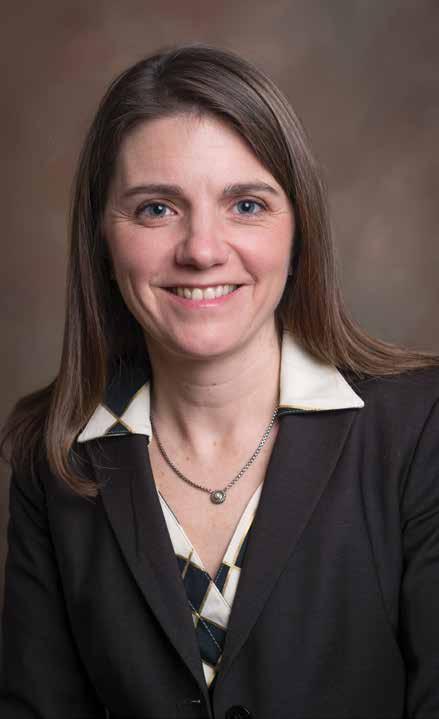

en Dardis (MBA ’00) celebrated 25 years since graduating from Darden this spring. For much of her time since leaving Grounds, she’s been in Baltimore, Maryland, where she lives with her husband and two children, rising through the ranks of global investment management powerhouse T. Rowe Price. She became CFO and treasurer in 2021 and also serves as a member of the firm’s management committee. Her responsibilities include global oversight for the controller’s group, global tax, procurement, global product, corporate strategy, financial planning and analysis, and investor relations.
She also serves on the Gilman School Board of Trustees and is the former chair of the Maryland Food Bank Board of Directors. Before Darden, she earned a bachelor’s degree in economics from the College of William & Mary.
Read on to learn how Dardis manages a complex leadership position, why she’s stayed at T. Rowe Price for two decades and her favorite Darden memories.
What was your first job?
My first unpaid job was making photocopies for our family business. My first two paid jobs were both in high school — teaching horseback riding lessons and working in a frozen yogurt shop.
What’s the best advice you have ever received?
When building your career, raise your hand to take the project or assignment that no one else wants to tackle.
What motivates you?
Working with a team to create opportunities and solve problems.
What is your “superpower”?
Given my role, I have to transition from macro to micro and tactical
to strategic and back again. My Darden education trained me well to meet this range and pace.
When and where do you do your best thinking?
Late at night or early in the morning. I like to process out loud first, and then take time to process internally to sharpen my thinking.
What’s been on your mind lately?
The implications of new technologies on how we train and develop the next generation of talent.
What are you reading these days?
Range: Why Generalists Triumph in a Specialized World by David Epstein. This was given to me by someone highlighting the continued benefits of a liberal arts education.
How do you recharge?
Spending time with my family. These days, that is either traveling or just being Mom at the kids’ sporting events.
How do you deal with conflict?
I prefer to address it head on, preferably once both parties have had a chance to process any initial big emotions.
What characteristics do you look for in people?
Genuine, curious, driven to excellence
What makes you feel hopeful?
Seeing the innovative ideas and resiliency of the upcoming generation of leaders.
What is your favorite cause to support?
Food insecurity. I served on the board of the Maryland Food Bank, including as its chair for two years. Meeting this basic human need is foundational to addressing any other societal challenges.
If you could live anywhere, where would it be?
I love Baltimore, but I also love the South Atlantic Coast (Georgia, Florida) for warmer weather.
What do you lose sleep over?
Trying to separate the things I can control from the things I can’t, and responding accordingly.
Which class at Darden impacted you the most?
First Year Operations. It was a new topic for me, and it gave me a new set of frameworks and an alternate way to approach business opportunities. I love the “a-ha” moments of learning something entirely new.
What’s your favorite Darden memory?
My favorite Darden memories are from working with Learning Team 7 as we navigated First Year.
When building your career, raise your hand to take the project or assignment that no one else wants to tackle.
You’ve served at T. Rowe Price for nearly 20 years. What appealed to you about staying and growing within one organization?
The mission and the people. What we do as a firm matters to our clients. And working alongside people with similar goals and values has been a privilege.
T. Rowe Price helps people achieve their financial goals.
As CFO, you are responsible for T. Rowe Price achieving its financial goals. Does the nature of the business add pressure to your role?
In this business, there is a lot we can’t control that impacts our financial results. That puts increased pressure on managing the things we can control such as strategy, resource allocation and expense discipline.
Looking ahead, what about the investment management field’s future intrigues you most?
The continued evolution from products to solutions, which is being fueled by greater ability to personalize at scale. This creates tremendous possibility for how we can continue to improve client outcomes.
What’s one thing about T. Rowe Price’s business or the investment management industry in general people don’t know that they should know?
T. Rowe Price is known for our active management of equity, fixed income, alternatives, and multi-asset investment capabilities. We serve millions of clients globally and manage $1.57 trillion in assets under management as of 31 March 2025, about two-thirds of which are retirement-related.

Robert J. Hugin (MBA ’85), former chairman and CEO of Celgene Corp., received the Charles C. Abbott Award during Darden Reunion Weekend from the Alumni Association Board of Directors.
The award, Darden’s highest honor for alumni, recognizes Hugin’s decades of leadership and service to the School. He served on the Darden School Foundation Board of Trustees for more than 14 years, including as chair, and made wide-ranging philanthropic contributions that have advanced student access, faculty support and capital initiatives.
Hugin helped lead Celgene through a period of rapid growth and global expansion, transforming the company into one of the world’s most influential biotech firms before its acquisition by Bristol Myers Squibb.
At Darden, Hugin has supported scholarships for military veterans — including
the Colonel James L. Fowler and Robert J. Hugin U.S. Marine Corps Scholarships — and endowed funds honoring beloved Professors Emeriti Bill Sihler and Richard Brownlee. He also contributed to the development of The Forum Hotel, home to the Hugin Family Executive Boardroom. Hugin and his wife, Kathleen, are Principal Donors to the School and members of the Darden Society and the Hickory Club.
“Serving Darden over the years has benefited me in so many ways, far beyond what I’ve contributed to Darden,” Hugin said upon receiving the award. “I’m a better person because of my time at Darden as a student and my time afterward in helping Darden be as good a school and enterprise as it can be.”

CLASSES OF: 1961, 1966, 1971, 1976, 1981, 1986, 1991, 1996, 2001, 2006, 2011, 2016, 2021, 2025, ABBOTT SOCIETY (1957–75)

24–26
BY CAROLINE MACKEY
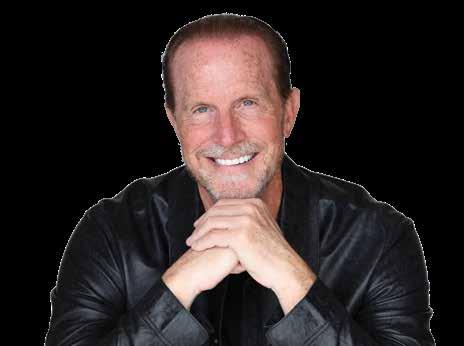
When his son became the target of cyberbullying, Roy Moore (MBA ’86) found himself facing a challenge that no amount of business training had prepared him for.
This crisis was one that nearly cost him his son’s life and ignited a mission that would eventually grow into Be Strong, a nonprofit focused on preventing bullying, which now reaches more than 2 million students annually across 4,000 schools nationwide.
Moore, a seasoned entrepreneur and Darden graduate, channeled both personal pain and professional insight into action. “I reached out to organizations that claimed to help,” he recalls. “But most couldn’t tell me the first thing to actually do as a parent.”
So he built something that could.
Be Strong offers evidence-based tools for addressing anxiety, depression, bullying and suicidal ideation, delivered through a peerto-peer model that empowers students to support one another.
“The students already know who’s struggling. They know who’s sitting alone at lunch,” says Moore. “We just give them the tools and structure to take action.”
Backed by Moore’s business acumen and shaped by lessons he first internalized at Darden — listening with intention, leading with integrity, thinking critically while fostering community — Be Strong has become a movement grounded in hope and belonging.
“FAITHFULNESS IS WHEN YOUR WORDS AND ACTIONS MATCH. THAT’S WHAT BUILDS TRUST IN ANY ORGANIZATION.
“What people need most is to feel known, loved and that they belong,” he says. “If you can give someone that, you’ve already begun to share a future worth living, thereby saving a life.”
Moore’s story is rooted in values he carried with him from the classroom to the boardroom: integrity, humility, faithfulness and generosity.
“Your integrity can’t be for sale,” he says.
“Faithfulness is when your words and actions match. That’s what builds trust in any organization.”
He has since stepped away from day-to-day operations at Be Strong, but the mission — to bring hope, health and healing to students — lives on.
These days, Moore remains active across several boards and ventures and is exploring a future personal platform focused on faith, leadership and entrepreneurship. But the lessons from Be Strong and from Darden continue to guide his work.
“You don’t have to see eye-to-eye to walk shoulder-to-shoulder,” Moore said. “That’s something I learned at Darden. And it’s something we need more of in the world right now.”

BY CAROLINE MACKEY
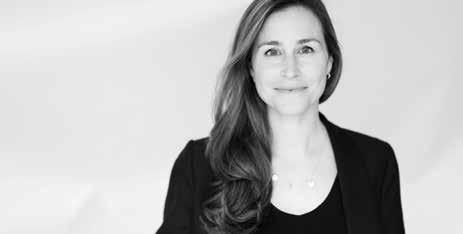
For Lily West (MBA ’12), it was love at first visit.
An admissions interview at the Darden School marked her first time in Charlottesville and, without a doubt, that visit changed everything.
West, who earned her undergraduate degree in journalism and political science from the University of North Carolina at Chapel Hill, spent her early career in broadcast news, national politics and public service.
“But Darden changed the course of my life in every possible way,” West says. “I wouldn’t be in this job. I wouldn’t be living in Charlottesville. I wouldn’t have the life I have now without the relationships, the education and the opportunities that Darden afforded me.”
Today, as President and CEO of the University of Virginia Alumni Association, West leads with the same values she developed at Darden, nurturing relationships that span generations. Her mission?
To make sure every UVA graduate feels connected to and invested in the life of the university.
“We’re in the business of relationship building,” she says. “Keeping people connected for a lifetime.”
Today, West is helping shape a chapter in the history of the UVA Alumni Association: a new Alumni Hall.
The building, set for groundbreaking this year, will replace the alumni association’s 1936-era home and serve as a modern, welcoming hub for future generations of alumni.
“It’s the most ambitious thing we’ve ever done,” West says. “It’s going to help us meet the needs of all the alumni we serve, now and into the future.”
“
AS LONG AS YOU HAVE VALUES-BASED LEADERSHIP AND STRONG BUSINESS FUNDAMENTALS, YOU CAN TACKLE AN EXTRAORDINARY RANGE OF CHALLENGES.
West’s leadership style was shaped at its foundation by her Darden experience.
“At Darden, you learn to lead with your values and make good decisions with limited information. As long as you have values-based leadership and strong business fundamentals, you can tackle an extraordinary range of challenges.”
She continues to carry Darden with her, both personally and professionally.
Some professors became mentors and lifelong friends. She still remembers the anxiety of sitting in Professor Luann Lynch’s accounting class, only to end up loving the subject and ultimately becoming close friends with Lynch.
Beyond the university, West fosters an active life in the Charlottesville community.
She founded a local women’s networking group, The She Lab; guest lectures at Darden; and enjoys the chaos and joy of life with her two young sons, Benjamin and Harrison.
Her advice to current students? Lean into the alumni network.
“Darden’s alumni base is arguably its most valuable resource,” she says. “And I promise, that email you send to an alum, it might be the brightest spot in their day.”
As West sees it, every connection counts. And thanks to Darden, she’s made a career — and life — out of nurturing them.
BY DAVE HENDRICK
The son of a U.S. Special Forces soldier, Diego Pacheco (MBA ’19) had a globe-spanning childhood, with stints in New Mexico, Europe, Asia, Oklahoma and Kentucky, among others.
The common denominator in Pacheco’s recollection: new schools and new houses, with the latter sparking an interest that would grow into a passion.
“From a very young age, I remember driving around new neighborhoods, helping my family find our next home,” said Pacheco.
His father urged him to explore commercial real estate after college, and Pacheco was accepted into the prestigious Wheel training program at real estate giant CBRE.
He spent more than four years working with companies like Kroger, Rite Aid and Banco Popular, but it was the brand in the portfolio that no one quite knew what to do with — Sky Zone Trampoline Park — that would prove to be both a resounding success and a repeatable framework for another fast-growing recreational activity a few years later.
Working with Sky Zone’s real estate lead, Pacheco helped usher in a period of rapid growth. It was exhilarating, but he knew his financial acumen was not as strong as it could be.
After graduating from Darden, he landed a coveted private equity role in the San Francisco Bay Area. In 2021, Pacheco moved to JLL Technologies’ venture capital arm. Then his former Sky Zone partner called — was Pacheco interested in pickleball?
“He said, ‘Remember all this experience we got in building Sky Zone and doing big box retail real estate? Well, what if we started an indoor pickleball franchise concept?’” Pacheco said. “He said, ‘I want you on my side, because you have all of the relationships and now you know the financial side.’”
Pacheco thought often of Professor Peter Belmi’s “Paths to Power” course and the imperative to move on if not surrounded by a supportive team. Here was a team he wanted to be a part of.
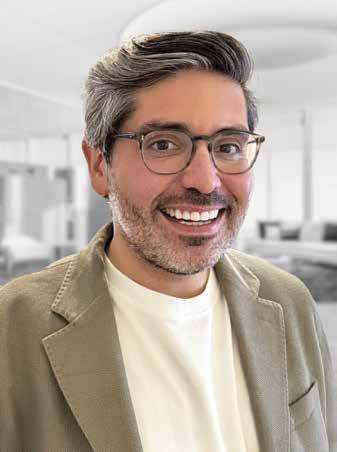
PACHECO’S PITCH WAS POWERED BY THE LANGUAGE OF FINANCE HE HONED AT DARDEN, ALONGSIDE NARRATIVE BUILDING AND RELATIONSHIP CULTIVATION.
Pacheco joined Ace Pickleball Club as chief growth officer and a founding team member as pickleball realized a meteoric ascent. The club opened its first location in suburban Atlanta, Georgia, in 2023, has 35 clubs open or under development, and has sold more than 150 franchise licenses across the country.
Major corporate landlords and experienced franchisees knew the Sky Zone growth story and saw the care and attention the Ace team was giving to a successful rollout, Pacheco said. He explained to major commercial real estate companies why a new Ace is more appealing than another discount clothing store. His pitch was powered by the language of finance Pacheco honed at Darden, alongside narrative building and relationship cultivation.
With Ace thriving, Pacheco recently transitioned to an adviser role and took a full-time position as senior vice president and partner with TSCG, once again helping new and established brands grow across the country.
The two leadership boards of the Darden School of Business are composed of nearly 100 distinguished leaders who serve as an innovative force in the advancement of the Darden School throughout the world.
(as of 30 June 2025)
Thank you to our alumni and volunteer leaders for a record year of support for Darden.
Chair
Frank M. Sands (MBA ’94) Sands Capital
Vice Chair
John D. Fowler Jr. (MBA/JD ’84) Baycrest Capital LLC
Immediate Past Chair
Martina Hund-Mejean (MBA ’88) Retired, Mastercard International Inc.
Scott C. Beardsley University of Virginia Darden School of Business
John P. Bolduc (MBA ’90) H.I.G. Capital
Kim Brown (MBA ’93) Canterbury Partners
H. William Coogan Jr. (MBA ’82) Retired, Firstmark Corp.
James A. Cooper (MBA ’84) Thompson Street Capital Partners
Guillaume M. Cuvelier (MBA ’91) Alps Beverages LLC
Robert G. Doumar Jr. (MBA/JD ’88) Park Square Capital LLP
Debra Draughan (MBA ’84) The Process Management Group LLC
Frank S. Edmonds (MBA/JD ’95) Panning Capital Management
Arnold B. Evans (MBA/JD ’97) JP Morgan Chase & Co.
Richard B. Evans University of Virginia Darden School of Business
Catherine J. Friedman (MBA ’86) GV
Kirsti W. Goodwin (MBA ’02) Tower3 Investments
Peter M. Grant II (MBA ’86) Anchormarck Holdings LLC
Owen D. Griffin Jr. (MBA ’99) Currie Medical
Yael Grushka-Cockayne University of Virginia Darden School of Business
Constance J. Hallquist (MBA ’91) Garnet Hill
Robert J. Hugin (MBA ’85) Retired, Celgene Corp.
Mark J. Kington (MBA ’88) Kington Management LLC
David M. LaCross (MBA ’78) Morgan Territory Brewing
Beverly B. Ladley (MBA ’92) Consultant
Douglas R. Lebda (EMBA ’14) LendingTree Inc.
Lemuel E. Lewis (MBA ’72) Iv Media LLC
Nicole M. Lindsay (MBA/JD ’99) Mastercard International Inc.
Amanda Lozano (MBA ’09) North Fork Partners LLC
Paul Mahoney University of Virginia School of Law
Richard A. Mayo (MBA ’68) Game Creek Capital
Donald E. Morel Jr. (TEP ’97) Progenitor Capital LLC
Adair B. Newhall (MBA ’09) StepStone Group
Diem H.D. Nguyen (MBA ’01) SIGA
G. Ruffner Page Jr. (MBA ’86) O’Neal Industries LLC
Carl Peoples (MBA ’94) Goldmach Sachs Group Inc.
C. Evans Poston Jr. (EMBA ’17) Hunton Andrews Kurth LLP
Matthew J. Reintjes (MBA ’04) YETI
James E. Ryan University of Virginia
Michael Sabel Venture Global LNG
Erik A. Slingerland (MBA ’84) EAS International S.A.
Robert W. Smith (MBA ’87) Retired, T. Rowe Price Trust Co.
Shannon G. Smith (MBA ’90) Abundant Power Group
Susan N. Sobbott (MBA ’90) Independent Consultant
Cynthia K. Soledad (MBA ’02) Egon Zehnder
Anand Emmanuel Stanley (MBA ’03) Airbus
Mark J. Styslinger Altec Industries Inc.
Bruce R. Thompson (MBA ’90) Bank of America
Lilo Simmons Ukrop (MBA ’89) University of Virginia Darden School of Business
Edward W. Valentine (MBA ’93) Harris Williams & Company
Steven C. Voorhees (MBA ’80) Retired, WestRock
Marietta Edmunds Zakas (MBA/JD ’84) Mueller Water Products Inc.
Chair
Cynthia K. Soledad (MBA ’02) Egon Zehnder
Rachel Barnes (MBA ’21) Royer Cooper Cohen Braunfeld LLC
Jennifer Briggs (MBA ’14) Pfizer, Inc.
Stephen (Gregg) Brooks (MBA ’09) Self employed
Mary Buckle Searle (MBA ’86)
Jordan H. Casserley (MBA ’20) McKinsey & Company
Sandhya K. Chhabra MD (EMBA ’17) Albemarle Endocrinology
Sean M. Corrigan (MBA ’05) Boston Consulting Group
Richard P. Dahling (MBA ’87) Consultant
Zhana Edmonds (MBA ’19) CVS Health
Richard C. Edmunds III (MBA ’92) PricewaterhouseCoopers
Rachel M. Edwards (MBA ’22)
Sarita T. Finnie (MBA ’01) Bayer
Theresa O. Frankiewicz (MBA ’87) Retired, Crown Community Development
James Freedman Aponte (MBA ’10) Meta
Michael J. Ganey (MBA ’78) GaneyNPD
Leslie P. Gordon (MBA ’89) Korn Ferry
Betsy Gorton (MBA ’04) Goldman Sachs Group, Inc.
Jacqueline Grace (MBA ’10)
Taylor P. Heaps (MBA ’13) Robert W. Baird
Karen O. Henneberger (EMBA ’20) 7 Rules Consulting LLC
Sonia L. Hounsell (MBA ’99) FunkkOFF! Inc.
Evan Inra (EMBA ’08) Amazon
Gen A. Izutsu (MBA ’15) Veralto
Marcien B. Jenckes (MBA ’98) Comcast Corporation
Melissa Jenkins (MBA ’16) Kansas City Current
Kendall Jennings (MBA ’12) Accenture
Claritza E. Jimenez (EMBA ’21) Paramount/CBS News
Wei Jin (MBA ’99) Northwestern Mutual Life Insurance Company
Patrice Ju (MBA ’14) Google
Matthew A. Kaness (MBA ’02) GoodwillFinds Ecommerce Inc.
Markus A. Kritzler (MBA ’04) Carbon Upcycling Technologies
Xiang Liu (MBA ’05)
Jared Love (MBA ’07) NBCUniversal
Kristina F. Mangelsdorf (MBA ’94) KFM Executive Coaching (self-employed)
Sherry McCray (MBA ’05) Constellation
Lois M. McEntyre (MBA ’95) Intuit Inc.
Harold W. McGraw IV (MBA ’07) S&P Global
Rajan J. Mehra (MBA ’93) March Capital
Michael W. Meredith (GEMBA ’17) Command Star Capital LLC
Tami M. Moore (EMBA ’09) Tillman Fiber Co.
Tiffani C. Moore (EMBA ’16) Federal Housing Finance Agency
Betsy M. Moszeter (EMBA ’11) Green Alpha Investments
Nikhil Nath (MBA ’00) InterGlobe Enterprises
Ann H. S. Nicholson (MBA ’01) Corning Inc.
Chetan Peddada (MBA ’15) RJA Technologies
Alyssa N. Perez-Melendez (MBA ’20) Bain & Company
Alex R. Picou (MBA ’89) JP Morgan Private Bank
Jason Sinnarajah (MBA ’07) Kansas City Royals
Malcom Stewart (MBA ’24) Brown Advisory
David L. Tayman (MBA/JD ’99) Tayman Lane Chaverri LLP
Kelly M. Thomson (MBA ’99) Mubadala Capital
Zachary G. Upcheshaw (MBA ’15) Goldman Sachs Group Inc.
Gerrud Wallaert (TEP ’18) Brightmark
Meghan Welch (EMBA ’10) Plaid
Carter Whitelow (EMBA ’24) Virginia Chamber of Commerce
Daniele M. Wilson (MBA ’11) Google
Rebecca M. Wilson (MBA ’96) 20/20 Foresight Executive Search
Jose Maria Zertuche (MBA ’00) BlackRock
The Darden School offers its condolences to the families of the following individuals whose deaths have been reported to us in the past six months.

Andrew M. Allen (MBA ’65)
John D. Barbieri (MBA ’70)
Lucien L. Bass III (MBA ’65)
Timothy Brooke-Hunt (MBA ’73)
Freddie S. Brooks (MBA ’85)
J. Dabney Carr Jr. (MBA ’77)
James F. Carter (MBA ’67)
David S. Davies (MBA ’80)
Sara E. Davis (MBA ’79)
John B. Dawson Jr. (TEP ’65)
Kieran M. Doran (MBA ’98)
William K. Ebel Jr. (MBA ’60)
Ian H. Falconer (MBA ’71)
Patricia E. Faulkinberry (MBA ’81)
Paul Lowe Foster, Ph.D. (DBA ’69)
David A. Furrow (MBA/JD ’77)
Susan Ford Hammaker, Ph.D. (TEP ’92)
L. Shepley Hermann (MBA ’80)
Kenneth R. Kanter (TEP ’80)
Monica S. Krieger, Ph.D. (MBA ’82)
Robert E. Lee Jr. (MBA ’64)
Jody Howard Luck (MBA ’70)
Christopher B. McCluney (MBA ’80)
Michael T. Morrissett (MBA ’83)
James W. Murray Jr. (MBA ’72)
James D. Ogg (TEP ’87)
Katherine S. Perry (MBA ’77)
Lewis Price Jr. (TEP ’76)
George W. Redd (TEP ’82)
William P. Reed Jr. (MBA ’81)
Morton T. Saunders (MBA ’67)
Sanjeev Sehgal (MBA ’94)
C. Alexander Spivey (MBA ’74)

UVA Darden Executive Education & Lifelong Learning is a world-class learning solutions partner, providing immersive educational experiences, business transformation and talent development for your organization, through:
• Customizable leadership development for succession planning, functional excellence and strategic execution capability.
• Open enrollment offerings for key strategic talent within your organization.
• Learning & development at scale with blended and custom digital offerings to build key skills.
Discover why we’re a trusted, award-winning capability partner for Fortune 100 companies, U.S. military and federal agencies, and global associations. Darden Alumni and group enrollment discounts available for open programs.

University of Virginia Darden School Foundation
Change Service Requested
WE ’ RE ON THE BRINK OF A FUNDAMENTAL DISRUPTION IN HOW BUSINESSES ATTRACT,
22